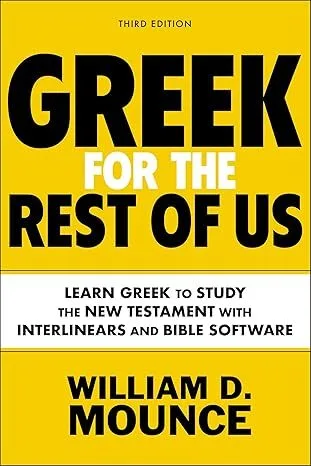Pronunciation Guide: ah-nee-ay-mee
Basic Definition

Key Information
ἀνίημι

Strong’s Entry
g447
Strong’s G447: ἀνίημι (aniēmi) fundamentally means “to send back, loosen, relax, or let go.” It carries the sense of releasing something from a state of confinement or tension. In biblical usage, it often conveys the idea of loosening bonds, both literal and metaphorical, highlighting God’s power to set free what was previously bound.
Etymology and Morphology
- Compound verb formed from ἀνά (ana, “up”) + ἵημι (hiēmi, “to send”)
- Primary usage in narrative sections describing physical actions
- Also appears in metaphorical contexts in teaching passages
- Common in classical Greek literature regarding the relaxation of tension
ἀνίημι Morphology:
- ἀνίημι (present active indicative) – I loosen/release
- ἀνῆκαν (aorist active indicative) – they loosened/released
- ἀνέθη (aorist passive indicative) – was loosened/released
- ἀνιέντες (present active participle) – loosening/releasing
- ἀνεθῆναι (aorist passive infinitive) – to be loosened/released
Origin & History
The word ἀνίημι has deep roots in classical Greek literature, where it was commonly used in contexts of physical release or relaxation. Xenophon employed it in his “Anabasis” to describe the loosening of military formations, while Hippocrates used it in medical contexts for the relaxation of bodily tension.
In the Septuagint, ἀνίημι appears in various contexts, notably in Joshua 10:6 where it describes the refusal to “let go” or “relax” military pressure. The word carries forward this sense of release from constraint into New Testament usage.
Expanded Definitions & Translation Options
- To loosen or unfasten what is bound
- To relax what is tense
- To release from confinement
- To let go or dismiss
- To send back or return to a previous state
ἀνίημι Translation Options:
- “Loosen” – When describing physical bonds or restraints
- “Release” – In contexts of setting something free
- “Relax” – When referring to the easing of tension
- “Let go” – In situations of relinquishing control
- “Send back” – When indicating return to an original state
Biblical Usage
The most dramatic usage of ἀνίημι occurs in Acts 16:26, where it describes the supernatural loosening of prison bonds during Paul and Silas’s imprisonment. This usage perfectly exemplifies both the literal and spiritual implications of the word – God’s power to break both physical and spiritual bonds.
In the Pauline epistles, the word takes on metaphorical significance, particularly in discussions of spiritual freedom and release from various forms of bondage. This dual application – both physical and spiritual – makes ἀνίημι a particularly rich term in biblical theology.
Key verses include:
- “Suddenly there was a great earthquake… and everyone’s bonds were unfastened [ἀνέθη].” Acts 16:26
- “Do not provoke your children to anger, but bring them up in the discipline and instruction of the Lord, loosening [ἀνιέντες] the bonds of harshness.” Ephesians 6:4
- “The strong wind that was holding us back released [ἀνέντος] its grip.” Acts 27:40
Cultural Insights
In ancient Jewish culture, the concept of “loosening” had significant religious implications, particularly in relation to the Sabbath and festival regulations. The rabbis frequently discussed what could be “loosened” or “bound” on holy days. This background adds depth to the New Testament usage of ἀνίημι, especially in contexts where Jesus and the apostles discuss spiritual freedom.
The word also carried important connotations in the Greco-Roman world, where the loosening of bonds could signify either legal manumission (the freeing of slaves) or release from debt. This cultural context helps explain why the early church found this word so appropriate for describing spiritual liberation.
Theological Significance
The use of ἀνίημι in the New Testament reveals a profound theological truth about God’s character – He is a God who loosens bonds and sets free. This is particularly evident in the Acts 16 account, where the loosening of physical chains parallels the spiritual liberation that comes through faith in the Messiah.
This word contributes to the broader New Testament theme of liberation, connecting with Yeshua’s declaration that He came to “set the captives free” (Luke 4:18). The divine act of loosening – whether physical, emotional, or spiritual bonds – demonstrates God’s power and desire to bring His people into freedom.
Personal Application
Understanding ἀνίημι challenges us to examine what bonds might need loosening in our own lives. These could be physical habits, emotional attachments, or spiritual strongholds that restrict our freedom in the Messiah. Just as Paul and Silas experienced supernatural liberation, we too can trust in God’s power to loosen whatever holds us bound.
This word also encourages us to participate in God’s liberating work by helping others find freedom – whether through prayer, counsel, or practical support. When we understand God as the ultimate “Loosener” of bonds, we become more attuned to His work of liberation in our world.
Related Words
- λύω (luō) – to loose, untie, release; focuses more on complete dissolution rather than gradual loosening See G3089
- ἐλευθερόω (eleutheroō) – to set free, liberate; emphasizes the resulting state of freedom See G1659
- ἀπολύω (apoluō) – to release, dismiss; often used in legal or formal contexts See G630
- χαλάω (chalaō) – to let down, slacken; similar but more specific to lowering objects See G5465
Did you Know?
- The same word ἀνίημι was used in ancient Greek maritime contexts to describe the lowering of sails, providing a vivid picture of releasing tension and allowing natural forces to take their course.
- In ancient medical texts, ἀνίημι was a technical term for the relaxation of muscles or the reduction of fever, suggesting a restoration to natural, healthy states.
- The compound nature of ἀνίημι (ἀνά + ἵημι) creates a word picture of “sending up/back,” which can be understood as returning something to its original, intended state – a beautiful picture of God’s restorative work.
Remember This
ἀνίημι reminds us that our God is not only powerful enough to break any bond but wise enough to know exactly how and when to loosen what constrains us.
Note: While this entry strives for accuracy, readers engaged in critical research should verify citations and keyword occurrences in their Bible translation of choice. For Biblical citations, the F.O.G Bible project recommends Logos Bible software.
Strong's g447




